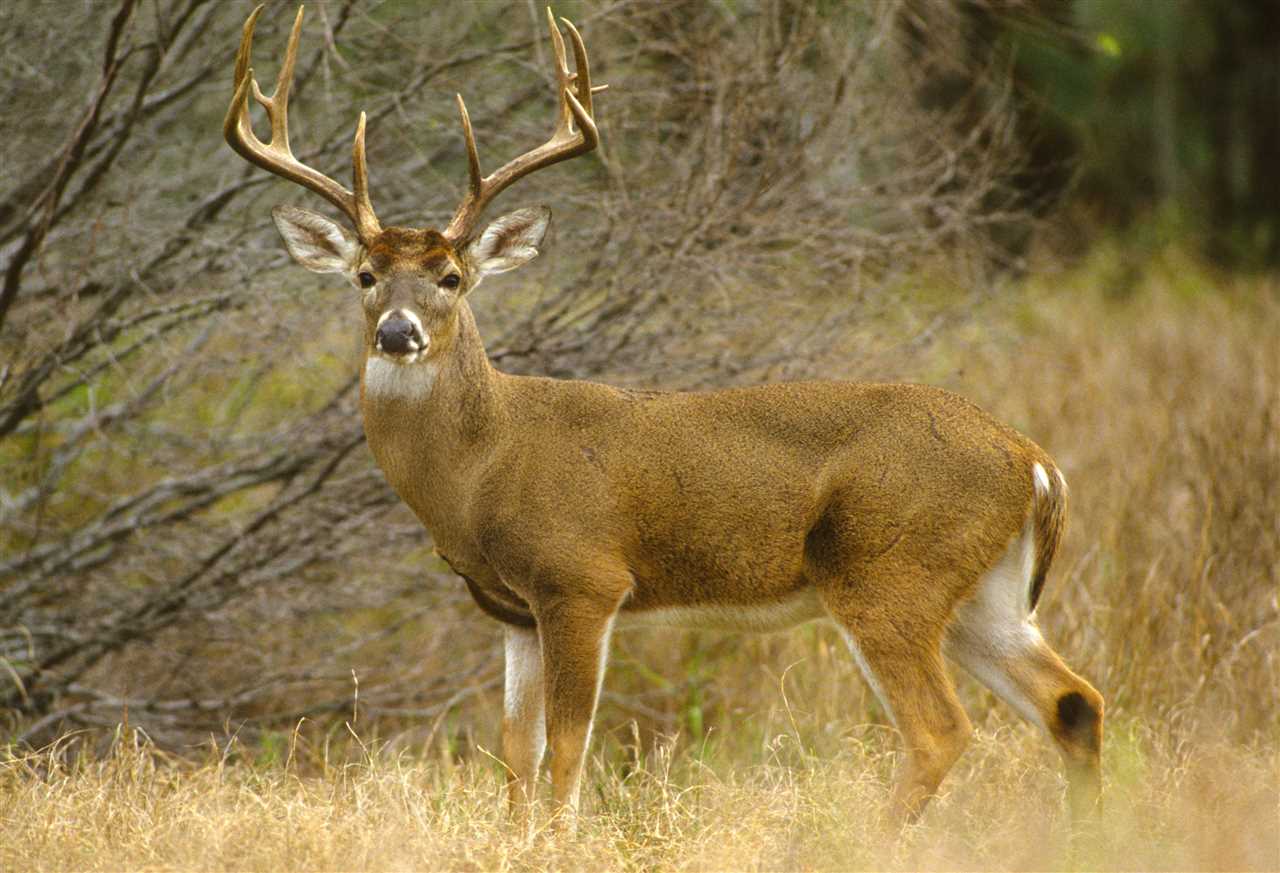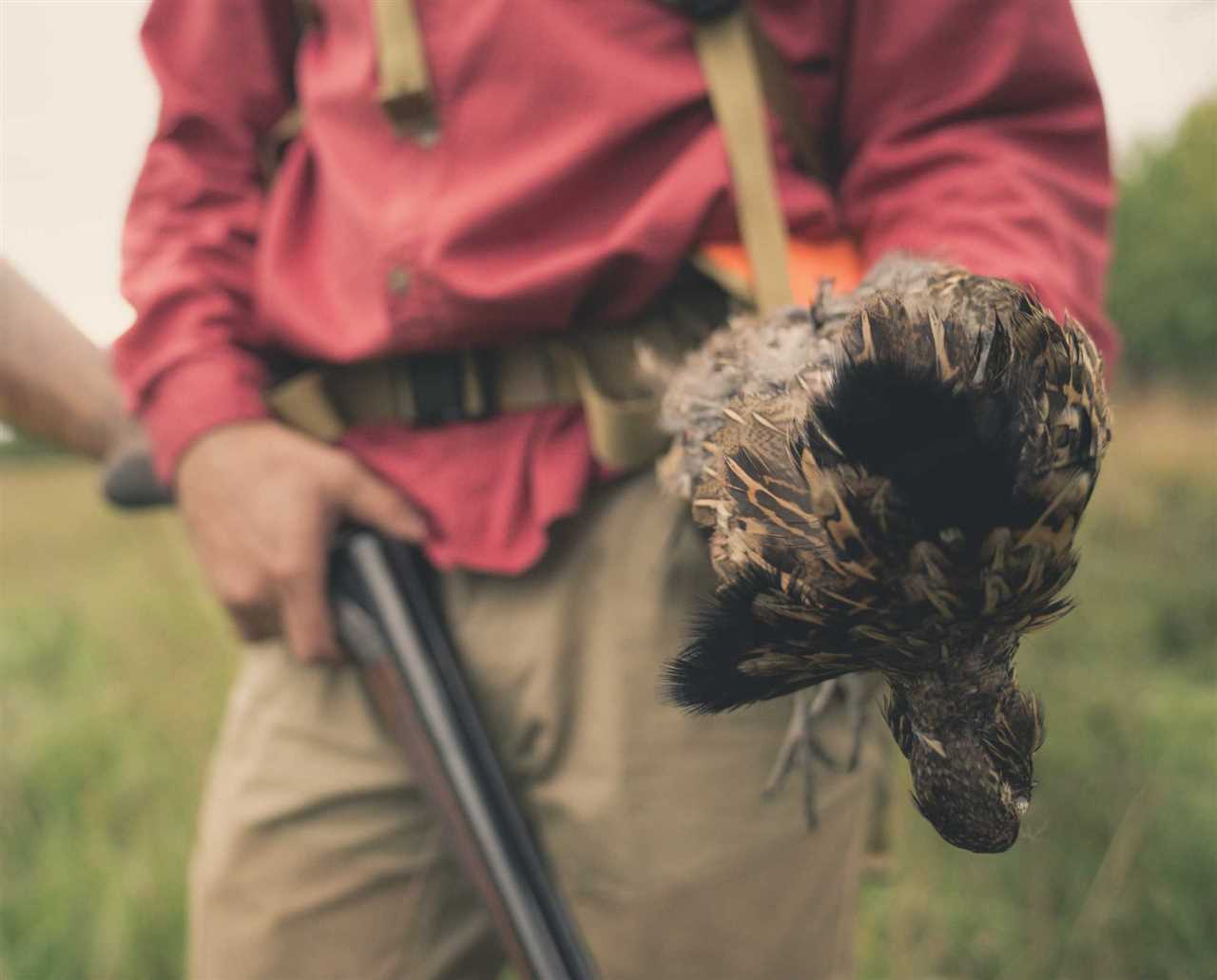Contents
Discover the Best Tips, Regulations, and Hunting Spots for Michigan’s Small Game Season

Welcome to Michigan, a paradise for small game hunters! With its diverse landscape and abundant wildlife, this state offers endless opportunities for those passionate about the thrill of the chase. Whether you’re an experienced hunter or just starting out, this guide will provide you with essential tips, regulations, and insights into the best hunting spots in Michigan.
Michigan’s small game season is a highly anticipated time for hunting enthusiasts. From rabbits and squirrels to pheasants and woodcocks, the game species available here are as diverse as the landscapes they inhabit. This season typically runs from September to January, allowing hunters ample time to pursue their favorite small game species.
Before heading out into the field, it’s crucial to familiarize yourself with the regulations set forth by the Michigan Department of Natural Resources (DNR). These regulations dictate bag limits, hunting seasons, and specific rules for each game species. It’s essential to stay informed and adhere to these guidelines to ensure the sustainability of wildlife populations and the preservation of Michigan’s natural beauty.
Now that you’re armed with the necessary knowledge, let’s explore some of the best hunting spots in Michigan. The Upper Peninsula boasts vast tracts of public land, such as the Hiawatha National Forest and the Ottawa National Forest. These areas are teeming with small game, providing hunters with countless opportunities for a successful hunt. In the Lower Peninsula, state game areas like Waterloo and Gladwin offer excellent small game hunting opportunities.
Tips for Hunting Small Game in Michigan

When hunting small game in Michigan, there are several important tips to keep in mind. Whether you’re targeting rabbits, squirrels, grouse, or other small game species, following these tips can improve your chances of a successful hunt:
- Know the regulations: Before heading out to hunt small game in Michigan, familiarize yourself with the state’s hunting regulations. This includes knowing the specific seasons, bag limits, and any special restrictions or requirements.
- Choose the right firearm: Selecting the appropriate firearm for small game hunting is crucial. Shotguns, .22 caliber rifles, and muzzleloaders are commonly used for hunting small game in Michigan. Make sure you are comfortable and accurate with your chosen firearm.
- Scout the area: Spend some time scouting the hunting area before your hunt. Look for signs of small game such as tracks, droppings, or feeding areas. This will give you a better idea of where to focus your hunting efforts.
- Practice good camouflage: Blend in with your surroundings by wearing appropriate camouflage clothing. This will help you stay hidden from small game and increase your chances of getting close for a clean shot.
- Use calls and decoys: Depending on the small game species you’re hunting, using calls and decoys can be effective. For example, squirrel calls or grouse calls can help attract these animals closer to your position.
- Be patient and observant: Small game hunting requires patience and a keen eye. Take your time, move slowly, and be observant of your surroundings. Small game can be easily spooked, so remaining still and quiet is important.
- Practice ethical hunting: Always follow ethical hunting practices. This includes making clean and humane shots, respecting private property boundaries, and properly disposing of any game you harvest.
By following these tips, you’ll be well-prepared for hunting small game in Michigan and increase your chances of a successful and enjoyable hunt.
Choosing the Right Firearm

When it comes to small game hunting in Michigan, selecting the right firearm can greatly enhance your chances of success in each season. Whether you’re pursuing upland birds, waterfowl, or small mammals, it’s important to choose a firearm that meets your specific needs and preferences.
The first step in choosing the right firearm is to consider the type of game you will be hunting. Different species of game require different firearms, so it’s crucial to do your research and understand the regulations for each season. For example, if you’re hunting upland birds such as pheasants or grouse, a lightweight shotgun with a tight choke would be a suitable choice. On the other hand, if you’re targeting waterfowl like ducks or geese, a shotgun with a larger gauge and longer barrel may be more effective.
In addition to considering the type of game, you’ll also want to think about your own shooting style and comfort level. Some hunters prefer the reliability and power of a traditional shotgun, while others may opt for a rifle or handgun. It’s important to choose a firearm that you feel confident and comfortable shooting, as accuracy plays a crucial role in small game hunting success.
It’s also worth considering the specific features and accessories that can enhance your hunting experience. For example, a firearm with a camouflage finish can help you blend into your surroundings and avoid detection by game. Additionally, an adjustable stock or sight can improve your aim and accuracy in various hunting scenarios.
Lastly, don’t forget to consider the legal requirements and regulations for firearms in Michigan. Make sure you familiarize yourself with the state’s hunting regulations, including any limitations on firearm types and capacities. It’s important to hunt responsibly and ensure that you’re in compliance with all laws and regulations.
Overall, choosing the right firearm is a crucial part of preparing for small game hunting season in Michigan. By considering the type of game, your shooting style, and any legal requirements, you can select a firearm that maximizes your chances of success in the field. So do your research, visit a reputable firearm dealer, and make an informed decision that will contribute to a memorable and rewarding hunting experience.
Scouting the Area

Scouting the area is essential for a successful small game hunting season in Michigan. Before heading into the field, it’s important to familiarize yourself with the landscape and specific hunting regulations for the area.
Start by researching the best small game hunting spots in Michigan. Look for areas with a high population of small game species such as rabbits, squirrels, or grouse. Public lands, state forests, and wildlife management areas are great places to start your search.
Once you have identified potential hunting spots, visit them prior to the season opening. This will give you a chance to assess the terrain, locate potential hiding spots, and identify food sources that small game species rely on.
During your scouting trips, pay attention to signs of small game activity. Look for tracks, droppings, feathers, or chewed vegetation. These signs will give you a good indication of the presence and abundance of small game in the area.
Additionally, take note of any natural features that may affect your strategy during the hunting season. This could include thickets, brush piles, or creek crossings that could serve as natural funnels or bottlenecks for small game movement.
Remember to always scout ethically and respectfully. Follow all wildlife management area rules and regulations, and obtain any necessary permits or licenses before scouting or hunting. By thoroughly scouting the area before the season begins, you increase your chances of a successful and enjoyable small game hunting experience in Michigan.
Using Suitable Hunting Techniques

When hunting small game in Michigan during the season, it’s important to use suitable hunting techniques for a successful and ethical hunt. Here are some tips to enhance your hunting experience:
1. Use stealth: Small game, such as rabbits and squirrels, have keen senses and can easily be frightened away. Move quietly and slowly through the woods, using natural cover to your advantage.
2. Practice patience: Small game can be elusive and may require patience to locate and track. Take your time and be prepared to wait for the right opportunity to make your shot.
3. Study their habits: Understanding the habits and patterns of the small game you are hunting can greatly increase your chances of success. Learn about their feeding and breeding habits, as well as the areas they frequent.
4. Use appropriate firearms or archery equipment: Michigan has specific regulations regarding the types of firearms and archery equipment that can be used during small game season. Make sure you are aware of these regulations and choose the appropriate weapon for your hunt.
5. Take ethical shots: When taking a shot at small game, make sure you have a clear and ethical shot that ensures a clean kill. Avoid taking risky shots that may wound the animal without bringing it down.
6. Utilize hunting dogs: Hunting dogs can be a valuable asset when hunting small game. Well-trained dogs can help flush out game and retrieve downed animals, making your hunting experience more efficient.
7. Practice firearm safety: Always follow proper firearm safety protocols when hunting. Treat every firearm as if it is loaded, never point the muzzle at anything you don’t intend to shoot, and keep your finger off the trigger until you are ready to shoot.
By using these suitable hunting techniques, you can increase your chances of a successful small game hunt in Michigan during the season while also ensuring a safe and ethical hunting experience.
Regulations for Small Game Hunting in Michigan

Michigan has various regulations in place that govern small game hunting in the state. These regulations ensure the sustainability of small game populations and promote responsible hunting practices. If you plan to engage in small game hunting in Michigan, it is important to be familiar with these rules and requirements:
- Hunting License: In order to hunt small game in Michigan, hunters are required to have a valid small game hunting license. This license can be purchased online or from authorized retailers.
- Season Dates: Michigan has specific hunting seasons for different small game species. It is important to check the Michigan Department of Natural Resources (DNR) website or consult the hunting regulations guide for the specific dates of each species’ season.
- Bag Limits: Bag limits refer to the maximum number of small game animals that a hunter is allowed to harvest in a day or during the entire hunting season. Each species has its own bag limit, and it is essential to know and adhere to these limits to prevent overharvesting. The bag limit may vary depending on the region in Michigan.
- Weapons and Ammunition: Michigan allows the use of specific firearms, bows, and crossbows for small game hunting. It is important to know the regulations regarding weapon types, caliber, and minimum draw weights for bows and crossbows.
- Public and Private Land: Michigan offers various public hunting lands where small game hunting is permitted. However, it is essential to familiarize yourself with the specific regulations and boundaries of these public hunting areas. If hunting on private land, be sure to obtain permission from the landowner.
- Hunting Hours: Hunting hours for small game in Michigan typically begin at dawn and end at dusk. However, it is recommended to check the hunting regulations guide or consult the DNR website for any specific restrictions or changes to hunting hours.
- Hunter Education: Michigan requires all hunters to complete a hunter education course before obtaining a hunting license. This course provides hunters with essential knowledge about hunting regulations, firearm safety, and conservation practices.
By following these regulations, hunters can ensure their activities are legal and ethical while contributing to the conservation of Michigan’s small game populations. It is important to stay updated with any changes or additional regulations that may apply to specific areas or seasons.
Licensing and Permit Requirements

In order to participate in the small game season in Michigan, hunters must obtain the appropriate licenses and permits. These requirements ensure that hunting is done responsibly and in accordance with state regulations.
The Michigan Department of Natural Resources (DNR) offers several options for obtaining the necessary licenses and permits. Hunters can choose from various types of licenses depending on their residency status, age, and intended game. There are separate licenses available for residents and non-residents, as well as discounted licenses for youth hunters and seniors.
When applying for a license, hunters may also need to provide certain documents and information. This may include a valid identification card, proof of residency, previous hunting experience, and completion of a hunter education course. The specific requirements may vary, so it’s important to carefully review the application process and provide all necessary documentation.
In addition to the hunting license, hunters may also need specific permits for certain game species. It’s important to check the regulations for the small game season to determine if any additional permits are required. This may include permits for waterfowl, rabbits, squirrels, and other small game.
The Michigan DNR also offers an online license system, making it easy for hunters to apply for and obtain the necessary licenses and permits. This system allows hunters to purchase and print their licenses from the comfort of their own homes, eliminating the need to visit a physical licensing location.
By obtaining the appropriate licenses and permits, hunters can ensure they are legally eligible to participate in the small game season in Michigan. This not only helps protect the wildlife population and preserve hunting traditions but also promotes a safe and responsible hunting environment for all participants.
| Type of License/Permit | Resident Cost | Non-Resident Cost |
|---|---|---|
| Hunting License | $10 | $150 |
| Junior Hunting License (Youth Hunters 16 and under) | $6 | N/A |
| Senior Hunting License (65 and older) | $6 | N/A |
| Waterfowl Stamp | $12 | $12 |
| Small Game License | $16 | $84 |
Bag Limits and Season Dates

In Michigan, small game hunting is regulated by bag limits and season dates. Bag limits refer to the number of animals that can be harvested during a given hunting season. These limits are put in place to ensure sustainable hunting practices and preserve the small game population.
The bag limits for small game vary depending on the species being hunted. Some examples of small game species in Michigan include rabbits, squirrels, and grouse. The bag limits for each of these species are determined by the Michigan Department of Natural Resources (DNR) and can be found in the Michigan Hunting and Trapping Digest.
Season dates are another important aspect of small game hunting in Michigan. Each small game season has specific start and end dates, which are set by the DNR. It is crucial for hunters to be aware of these dates to ensure that they are hunting within the legal and designated time frames.
Overall, understanding bag limits and season dates is essential for small game hunters in Michigan. By adhering to these regulations, hunters can contribute to the conservation efforts and ensure the longevity of their favorite game species.
Hunting Hours and Safety Guidelines

During the Michigan small game season, it is important to be aware of the designated hunting hours and follow safety guidelines to ensure a safe and enjoyable hunting experience.
The hunting hours for small game in Michigan are typically from one-half hour before sunrise to sunset. However, it is crucial to check the hunting regulations for the specific season and area as there may be variations in the hunting hours. It is recommended to arrive at your hunting spot well before sunrise to have enough time to set up and get ready for the day’s hunt.
When it comes to safety guidelines, the following are essential to follow:
- Always treat every firearm as if it is loaded and keep it pointed in a safe direction.
- Wear blaze orange clothing to make yourself visible to other hunters.
- Be aware of your surroundings and constantly identify your target before taking a shot.
- Never shoot at a sound or rustling in the bushes without positively identifying the target.
- Keep a safe distance from other hunters and avoid crowded hunting areas.
- Notify someone about your hunting plans, including your intended location and expected return time.
- Carry a first aid kit and know basic first aid procedures.
- Stay hydrated and bring enough food and water for the duration of your hunting trip.
By adhering to hunting hours and following safety guidelines, you can help maintain a safe hunting environment and decrease the risk of accidents or injuries during the Michigan small game season.

A skilled hunter, dedicated conservationist, and advocate for ethical practices. Respected in the hunting community, he balances human activity with environmental preservation.
